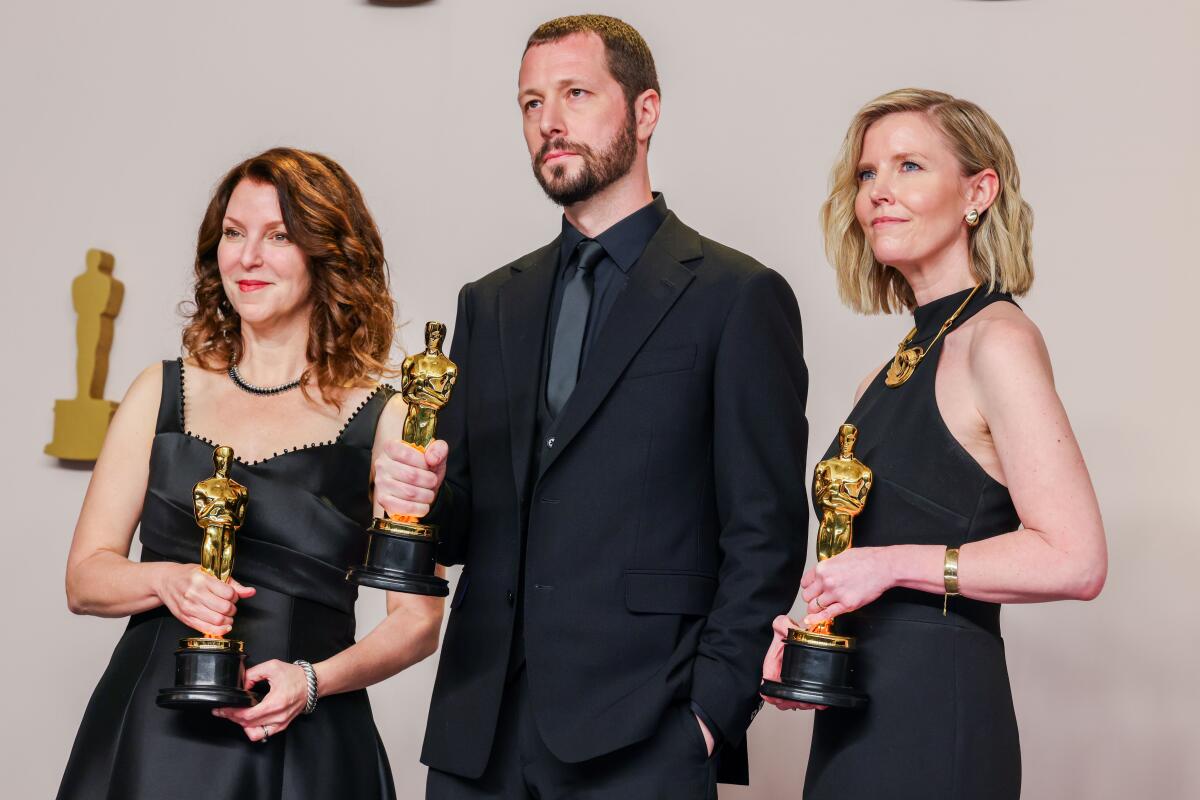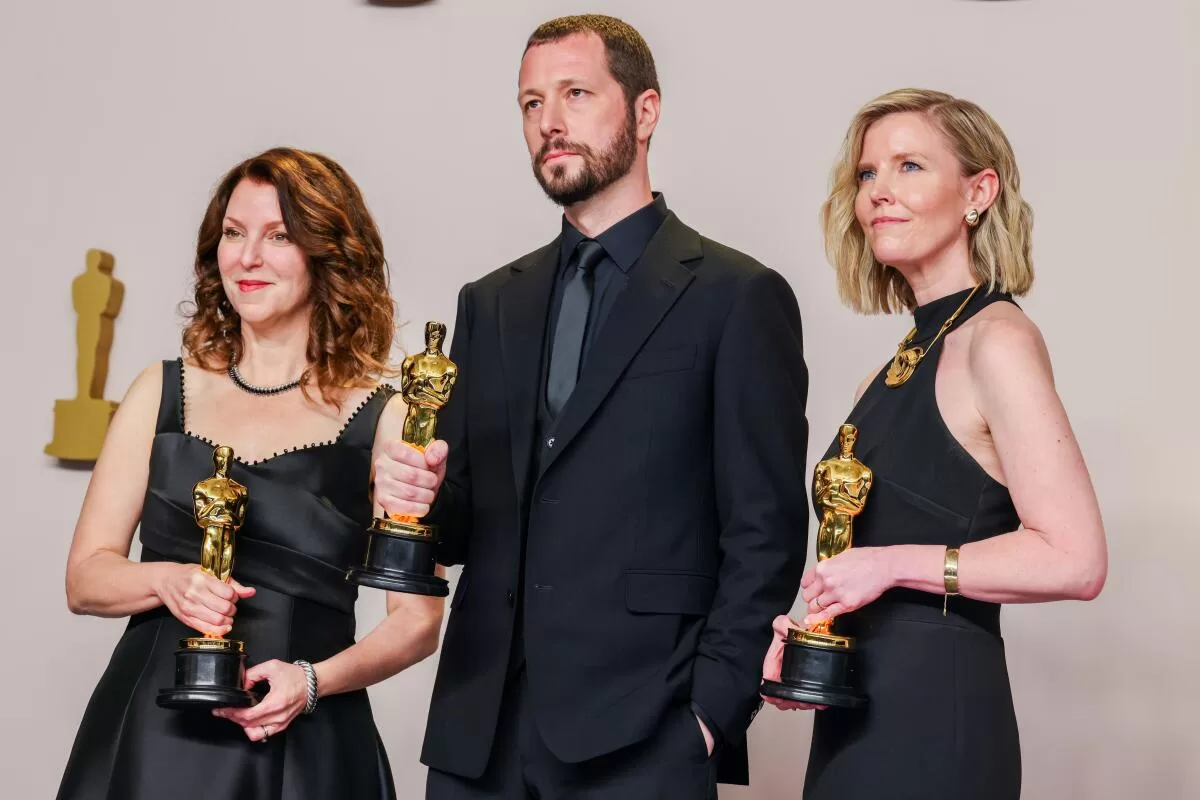Onstage at the ceremony, however, few speeches from winners during the first hours of the 96th Academy Awards made reference to world events, even at a time when Russia’s war with Ukraine and Israel’s attacks on Gaza continue to make headlines.
But some did, providing the evening with a few of its most dramatic and emotional moments. The winner of the international feature award was “The Zone of Interest,” written and directed by Jonathan Glazer, adapted from the novel by Martin Amis. The film focuses on the family life of Rudolf Höss, commandant of the Auschwitz concentration camp in Nazi-occupied Poland during World War II.
Glazer took the stage with producers James Wilson and Len Blavatnik to a standing ovation, putting his head down to read his speech with an anxious determination, saying: “All our choices were made to reflect and confront us in the present, not to say ‘Look what they did then,’ rather, ‘Look what we do now.’
“Our film shows where dehumanization leads at its worst. It’s shaped all of our past and present. Right now, we stand here as men who refute their Jewishness and the Holocaust being hijacked by an occupation which has led to conflict for so many innocent people, whether the victims of October the 7th in Israel or the ongoing attack on Gaza. All the victims of this dehumanization — how do we resist?”
Glazer’s remarks were met by applause in the room. He dedicated the award to the memory of the real-life woman depicted in the movie as sneaking to the camp at night to leave food for prisoners.

(Dania Maxwell/Los Angeles Times)
The winner of the documentary feature award was “20 Days In Mariupol,” which follows a group of journalists trapped in Mariupol during the Russian invasion of Ukraine. To a standing ovation, director Mstyslav Chernov began his speech by saying, “This is the first Oscar in the Ukrainian history.”
“And I am honored,” Chernov said. “But probably I will be the first director on this stage who will say I wish I had never made this film. I wish to be able to exchange this to Russia never attacking Ukraine, never occupying our cities. I wish to give all the recognition to Russia not killing tens of thousands of my fellow Ukrainians. I wish for them to release all the hostages, all the soldiers who are protecting their lands, all the civilians who are now in their jails.”
“But I cannot change the history. I cannot change the past,” Chernov continued. “But we all together — you, I am on you, some of the most talented people in the world — we can make sure that the history record is set straight and that the truth will prevail. And that the people of Mariupol and those who’ve given their lives will never be forgotten. Because cinema forms memories and memories form history.”
Chernov received a second standing ovation at the end of his speech.
Later in the program, the traditional In Memoriam segment opened with a clip of now-deceased Russian opposition leader Alexei Navalny speaking directly into the camera from the Oscar-winning documentary “Navalny.” The politician and Putin critic died last month while imprisoned in Russia.
Outside the event, pro-Palestinian protesters on the streets of Hollywood leading to the Dolby Theatre delayed the arrival of some attendees, and the show began a few minutes late.
Dave Mullins, director of the animated short film winner “War Is Over!,” said simply, “There’s an anti-war message we tried to honor with this film.” The short is inspired by the John Lennon and Yoko Ono song “Happy Xmas (War Is Over)” and their son, Sean Ono Lennon, co-writer of the film, was also onstage.
In his opening monologue, host Jimmy Kimmel made no mention of the Israel-Hamas war, but did speak to a conflict closer to home, referencing the recent WGA and SAG-AFTRA strikes before calling the evening’s crew onstage and voicing support for the unions entering into negotiations of their own.
“The reason we were able to make a deal is because of the people who rallied beside us,” Kimmel said. “So before we celebrate ourselves, let’s have a very deserved round of applause for the people who work behind the scenes, the Teamsters, the truck drivers, the lighting crew, sound, camera, gaffers, grips, all the people who refused to cross the picket lines. If you’re wearing Skechers to the Oscars, take a bow.”
“Thank you for standing with us,” Kimmel added, bringing much of the backstage crew onto the stage. “And also, we want you to know, in your upcoming negotiations we will stand with you, too. Also, I’m going to make sure this show goes really long tonight so you get a ton of overtime.”
Just before the presentation of best picture, Kimmel said, “I’m really proud of something and I was wondering if I could share it with you,” before reading an actual social media post from former President Donald Trump trashing Kimmel’s performance.
“Thank you for watching,” Kimmel added. “Isn’t it past your jail time?”
